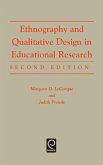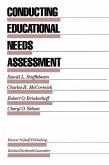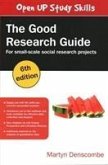Schade – dieser Artikel ist leider ausverkauft. Sobald wir wissen, ob und wann der Artikel wieder verfügbar ist, informieren wir Sie an dieser Stelle.
- Gebundenes Buch
- Merkliste
- Auf die Merkliste
- Bewerten Bewerten
- Teilen
- Produkt teilen
- Produkterinnerung
- Produkterinnerung
Conducting Educational Research, Sixth Edition thoroughly addresses the major components of research design and methodology. The text is especially useful for inexperienced student-researchers and doctoral students in the early stages of preparing a dissertation. The early chapters of the text clearly describe the process of selecting a problem, reviewing the literature, constructing a hypothesis, identifying and labeling variables, and constructing operational definitions. The later chapters assist students in refining methodological procedures, analyzing data, and writing the final research…mehr
Andere Kunden interessierten sich auch für
![Ethnography and Qualitative Design in Educational Research, 2nd Edition Ethnography and Qualitative Design in Educational Research, 2nd Edition]() Margaret Diane LecompteEthnography and Qualitative Design in Educational Research, 2nd Edition140,99 €
Margaret Diane LecompteEthnography and Qualitative Design in Educational Research, 2nd Edition140,99 €![Conducting Educational Needs Assessments Conducting Educational Needs Assessments]() D.L. StufflebeamConducting Educational Needs Assessments39,99 €
D.L. StufflebeamConducting Educational Needs Assessments39,99 €![Report of the Board of Education of the State of Maine, 1St-6Th Report of the Board of Education of the State of Maine, 1St-6Th]() Report of the Board of Education of the State of Maine, 1St-6Th35,99 €
Report of the Board of Education of the State of Maine, 1St-6Th35,99 €![A Guide to Conducting Research A Guide to Conducting Research]() Magwa SimuforosaA Guide to Conducting Research40,99 €
Magwa SimuforosaA Guide to Conducting Research40,99 €![The Good Research Guide, 6th Edition The Good Research Guide, 6th Edition]() DenscombeThe Good Research Guide, 6th Edition38,99 €
DenscombeThe Good Research Guide, 6th Edition38,99 €![Educational Research, the National Agenda, and Educational Reform Educational Research, the National Agenda, and Educational Reform]() Erwin V. JohanningmeierEducational Research, the National Agenda, and Educational Reform109,99 €
Erwin V. JohanningmeierEducational Research, the National Agenda, and Educational Reform109,99 €![Educational Research, the National Agenda, and Educational Reform Educational Research, the National Agenda, and Educational Reform]() Erwin V. JohanningmeierEducational Research, the National Agenda, and Educational Reform78,99 €
Erwin V. JohanningmeierEducational Research, the National Agenda, and Educational Reform78,99 €
Conducting Educational Research, Sixth Edition thoroughly addresses the major components of research design and methodology. The text is especially useful for inexperienced student-researchers and doctoral students in the early stages of preparing a dissertation. The early chapters of the text clearly describe the process of selecting a problem, reviewing the literature, constructing a hypothesis, identifying and labeling variables, and constructing operational definitions. The later chapters assist students in refining methodological procedures, analyzing data, and writing the final research report. The clarity of the text and the numerous practical examples help to reinforce important concepts and key ideas, increasing the efficacy of the text for even the most inexperienced student-researchers. Additionally, sample studies are included as models of acceptable published research and serve as a guide against which students may evaluate their own work. Changes in New Edition ·More illustrations, tables, figures, and bulleted lists to enhance understanding ·More and simpler explanations of complex process ·A greater balance between the various approaches to research, ranging from experimental to qualitative, with causal-comparative, survey, and evaluation in-between Part I ·Expanded to include additional ethical considerations when conducting research. Part II: ·Renamed "Carrying out Fundamental Steps of Research" ·Additional details regarding measurement and observation ·Expanded discussion of the application of design criteria Part III: ·Renamed "Carrying out Quantitative Research" ·Additional chapters on experimental research, correlational and causal-comparative research, survey research, and evaluation research.
Produktdetails
- Produktdetails
- Verlag: Rowman & Littlefield Publishers
- 6th Edition
- Seitenzahl: 532
- Erscheinungstermin: 1. Februar 2012
- Englisch
- Abmessung: 260mm x 183mm x 33mm
- Gewicht: 1186g
- ISBN-13: 9781442209633
- ISBN-10: 1442209631
- Artikelnr.: 34100133
- Verlag: Rowman & Littlefield Publishers
- 6th Edition
- Seitenzahl: 532
- Erscheinungstermin: 1. Februar 2012
- Englisch
- Abmessung: 260mm x 183mm x 33mm
- Gewicht: 1186g
- ISBN-13: 9781442209633
- ISBN-10: 1442209631
- Artikelnr.: 34100133
Bruce W. Tuckman is professor of educational psychology at the Ohio State University, where he is also Founding Director of the Walter E. Dennis Learning Center. Tuckman is an American Psychologist, who has carried out seminal research into the theory of group dynamics. In 1965, he published a model of group development called Tuckman's Stages, with stages of Forming, Storming, Norming, and Performing. In 1977, he added a fifth stage named Adjourning. Tuckman's current scholarly interest focuses on the topic of motivation: its manifestation in the form of self-regulatory behavior, and its absence in the form of procrastination, particularly as applied to the behavior of studying. He is building a model linking motivational factors to school achievement, and is examining specific interventions that enhance the self-regulatory behavior of students. He is also interested in study strategies that help students learn from text. Brian E. Harper is associate professor of educational psychology at Cleveland State University. A former classroom teacher in the Philadelphia , Pennsylvania public school district, Dr. Harper completed his doctoral work at The Ohio State University in Educational Psychology. His research interests include African American racial identity development and motivational psychology, particularly as it applies to students in urban settings. His current work focuses on African American students and the factors that promote or inhibit academic self-regulation.
Part I. Introduction Chapter 1: The Role of Research What Is Research?
Validity in Research Internal and External Validity Dealing With Reality
Survey Research Characteristics of the Research Process Some Ethical
Considerations Self Evaluations Part II. Fundamental Steps of Research
Chapter 2: Selecting a Problem Characteristics of a Problem Narrowing the
Range of Problems Classroom Research Problems Another Problem Framework
Programmatic Research as a Source of Problems Specific Considerations in
Choosing a Problem Chapter 3: Reviewing the Literature The Purpose of the
Review Literature Review Sources Conducting a Literature Search Reviewing
and Abstracting Writing the Literature Review Chapter 4: Identifying and
Labeling Variables A Research Question and Its Variables The Independent
Variable The Dependent Variable The Relationship Between Independent and
Dependent Variables The Moderator Variable Control Variables Intervening
Variables The Combined Variables Some Considerations for Variable Choice
Chapter 5: Constructing Hypotheses and Meta-Analyses Formulating Hypotheses
Hypotheses Based on Conceptualizing Going From Theory to Hypotheses: An
Example Meta-Analysis: Constructing Hypotheses by Synthesizing Past
Research Some Further Illustrations Testing a Hypothesis Chapter 6:
Constructing Operational Definitions of Variables Why Have Operational
Definitions? Basing an Operational Definition on Observable Criteria
Alternative Ways of Generating Operational Definitions The Criterion of
Exclusiveness Operational Definitions and the Research Process The Research
Spectrum Part III. Types of Research Chapter 7: Applying Design Criteria:
Internal and External Validity The Control Group Factors Affecting Internal
Validity or Certainty Factors Affecting External Validity or Generality
Controlling for Participant Bias: Equating Experimental and Control Groups
Controlling for Experience Bias: Equating Experimental and Control
Conditions Overall Control of Participant and Experience Bias Appraising
the Success of the Manipulation Chapter 8: Experimental Research Designs A
Shorthand for Displaying Designs Pre-Experimental Designs (Non-designs)
True Experimental Designs Factorial Designs Quasi-Experimental Designs Ex
Post Facto Designs Designs to Control for External Validity Based on
Reactive Effects Chapter 9: Correlational and Casual-Comparative Research
Correlational and Casual-Comparative Research Correlational Research Steps
to Conducting a Correlational Study Casuaul-Comparative Research
Longitudinal Research Threats to Internal and External Validity for the
Three Designs Chapter 10: Identifying and Describing Procedures for
Observation and Measurement Test Reliability Test Validity Types of
Measurement Scales Ordinal Scales Describing Test Performances
Standardized, or Norm-Referenced, Tests Criterion-Referenced Tests
Constructing a Paper-and-Pencil Performance Test Constructing a Scale
Constructing an Observation Recording Device Chapter 11: Constructing and
Using Questionnaires, Interviews, and Survey Research What is Survey
Research? What Do Questionnaires and Interviews Measure? Question Formats:
How to Ask the Questions Response Modes: How to Answer the Questions
Constructing a Questionnaire or Interview Schedule Sampling Procedures
Procedures for Administrating a Questionnaire Conducting an Interview Study
Coding and Scoring Part IV. Concluding Steps of Research Chapter 12
Carrying Out Statistical Analyses Measures of Central Tendency and
Variability Coding and Rostering Data Choosing the Appropriate Statistical
Test Carrying Out Parametric Statistical Tests Correlation and Regression
Analyses Carrying Out Nonparametric Statistical Tests Chapter 13: Writing a
Research Report The Research Proposal The Introduction Section The Method
Section The Results Section The Discussion Section The References The
Abstract Preparing Tables Preparing Figures and Graphs Getting an Article
Published Part V. Additional Approaches Chapter 14: Conducting Evaluation
Studies Formative Versus Summative Evaluation A Model for Summative
Evaluation Defining the Goals of a Program Measuring the Goals of a Program
(The Dependent Variable) Assessing Attainment of a Program's Goals Design,
Data Collection, and Statistical Analysis Chapter 15: Qualitative Research:
Concepts and Analysis Characteristics of Qualitative Research Identifying
General Research Problems Specifying the Questions to Answer Research
Methodology Data Sources Conducting a Case Study Analyzing the Data and
Preparing the Report Chapter 16: Action Research What is Action Research?
Assumptions That Guide Action Research The Process of Action Research
Evaluation Action Research Part VI. The "Consumer" of Research Chapter 17:
Analyzing and Critiquing a Research Study The Introductory Section The
Method Section The Results and Discussion Sections An Sample Research
Report: Analysis and Critique An Example Evaluation Part VII. Appendixes
Appendix A: Tables Appendix B: Worksheets for Performing Statistical Tests
Validity in Research Internal and External Validity Dealing With Reality
Survey Research Characteristics of the Research Process Some Ethical
Considerations Self Evaluations Part II. Fundamental Steps of Research
Chapter 2: Selecting a Problem Characteristics of a Problem Narrowing the
Range of Problems Classroom Research Problems Another Problem Framework
Programmatic Research as a Source of Problems Specific Considerations in
Choosing a Problem Chapter 3: Reviewing the Literature The Purpose of the
Review Literature Review Sources Conducting a Literature Search Reviewing
and Abstracting Writing the Literature Review Chapter 4: Identifying and
Labeling Variables A Research Question and Its Variables The Independent
Variable The Dependent Variable The Relationship Between Independent and
Dependent Variables The Moderator Variable Control Variables Intervening
Variables The Combined Variables Some Considerations for Variable Choice
Chapter 5: Constructing Hypotheses and Meta-Analyses Formulating Hypotheses
Hypotheses Based on Conceptualizing Going From Theory to Hypotheses: An
Example Meta-Analysis: Constructing Hypotheses by Synthesizing Past
Research Some Further Illustrations Testing a Hypothesis Chapter 6:
Constructing Operational Definitions of Variables Why Have Operational
Definitions? Basing an Operational Definition on Observable Criteria
Alternative Ways of Generating Operational Definitions The Criterion of
Exclusiveness Operational Definitions and the Research Process The Research
Spectrum Part III. Types of Research Chapter 7: Applying Design Criteria:
Internal and External Validity The Control Group Factors Affecting Internal
Validity or Certainty Factors Affecting External Validity or Generality
Controlling for Participant Bias: Equating Experimental and Control Groups
Controlling for Experience Bias: Equating Experimental and Control
Conditions Overall Control of Participant and Experience Bias Appraising
the Success of the Manipulation Chapter 8: Experimental Research Designs A
Shorthand for Displaying Designs Pre-Experimental Designs (Non-designs)
True Experimental Designs Factorial Designs Quasi-Experimental Designs Ex
Post Facto Designs Designs to Control for External Validity Based on
Reactive Effects Chapter 9: Correlational and Casual-Comparative Research
Correlational and Casual-Comparative Research Correlational Research Steps
to Conducting a Correlational Study Casuaul-Comparative Research
Longitudinal Research Threats to Internal and External Validity for the
Three Designs Chapter 10: Identifying and Describing Procedures for
Observation and Measurement Test Reliability Test Validity Types of
Measurement Scales Ordinal Scales Describing Test Performances
Standardized, or Norm-Referenced, Tests Criterion-Referenced Tests
Constructing a Paper-and-Pencil Performance Test Constructing a Scale
Constructing an Observation Recording Device Chapter 11: Constructing and
Using Questionnaires, Interviews, and Survey Research What is Survey
Research? What Do Questionnaires and Interviews Measure? Question Formats:
How to Ask the Questions Response Modes: How to Answer the Questions
Constructing a Questionnaire or Interview Schedule Sampling Procedures
Procedures for Administrating a Questionnaire Conducting an Interview Study
Coding and Scoring Part IV. Concluding Steps of Research Chapter 12
Carrying Out Statistical Analyses Measures of Central Tendency and
Variability Coding and Rostering Data Choosing the Appropriate Statistical
Test Carrying Out Parametric Statistical Tests Correlation and Regression
Analyses Carrying Out Nonparametric Statistical Tests Chapter 13: Writing a
Research Report The Research Proposal The Introduction Section The Method
Section The Results Section The Discussion Section The References The
Abstract Preparing Tables Preparing Figures and Graphs Getting an Article
Published Part V. Additional Approaches Chapter 14: Conducting Evaluation
Studies Formative Versus Summative Evaluation A Model for Summative
Evaluation Defining the Goals of a Program Measuring the Goals of a Program
(The Dependent Variable) Assessing Attainment of a Program's Goals Design,
Data Collection, and Statistical Analysis Chapter 15: Qualitative Research:
Concepts and Analysis Characteristics of Qualitative Research Identifying
General Research Problems Specifying the Questions to Answer Research
Methodology Data Sources Conducting a Case Study Analyzing the Data and
Preparing the Report Chapter 16: Action Research What is Action Research?
Assumptions That Guide Action Research The Process of Action Research
Evaluation Action Research Part VI. The "Consumer" of Research Chapter 17:
Analyzing and Critiquing a Research Study The Introductory Section The
Method Section The Results and Discussion Sections An Sample Research
Report: Analysis and Critique An Example Evaluation Part VII. Appendixes
Appendix A: Tables Appendix B: Worksheets for Performing Statistical Tests
Part I. Introduction Chapter 1: The Role of Research What Is Research?
Validity in Research Internal and External Validity Dealing With Reality
Survey Research Characteristics of the Research Process Some Ethical
Considerations Self Evaluations Part II. Fundamental Steps of Research
Chapter 2: Selecting a Problem Characteristics of a Problem Narrowing the
Range of Problems Classroom Research Problems Another Problem Framework
Programmatic Research as a Source of Problems Specific Considerations in
Choosing a Problem Chapter 3: Reviewing the Literature The Purpose of the
Review Literature Review Sources Conducting a Literature Search Reviewing
and Abstracting Writing the Literature Review Chapter 4: Identifying and
Labeling Variables A Research Question and Its Variables The Independent
Variable The Dependent Variable The Relationship Between Independent and
Dependent Variables The Moderator Variable Control Variables Intervening
Variables The Combined Variables Some Considerations for Variable Choice
Chapter 5: Constructing Hypotheses and Meta-Analyses Formulating Hypotheses
Hypotheses Based on Conceptualizing Going From Theory to Hypotheses: An
Example Meta-Analysis: Constructing Hypotheses by Synthesizing Past
Research Some Further Illustrations Testing a Hypothesis Chapter 6:
Constructing Operational Definitions of Variables Why Have Operational
Definitions? Basing an Operational Definition on Observable Criteria
Alternative Ways of Generating Operational Definitions The Criterion of
Exclusiveness Operational Definitions and the Research Process The Research
Spectrum Part III. Types of Research Chapter 7: Applying Design Criteria:
Internal and External Validity The Control Group Factors Affecting Internal
Validity or Certainty Factors Affecting External Validity or Generality
Controlling for Participant Bias: Equating Experimental and Control Groups
Controlling for Experience Bias: Equating Experimental and Control
Conditions Overall Control of Participant and Experience Bias Appraising
the Success of the Manipulation Chapter 8: Experimental Research Designs A
Shorthand for Displaying Designs Pre-Experimental Designs (Non-designs)
True Experimental Designs Factorial Designs Quasi-Experimental Designs Ex
Post Facto Designs Designs to Control for External Validity Based on
Reactive Effects Chapter 9: Correlational and Casual-Comparative Research
Correlational and Casual-Comparative Research Correlational Research Steps
to Conducting a Correlational Study Casuaul-Comparative Research
Longitudinal Research Threats to Internal and External Validity for the
Three Designs Chapter 10: Identifying and Describing Procedures for
Observation and Measurement Test Reliability Test Validity Types of
Measurement Scales Ordinal Scales Describing Test Performances
Standardized, or Norm-Referenced, Tests Criterion-Referenced Tests
Constructing a Paper-and-Pencil Performance Test Constructing a Scale
Constructing an Observation Recording Device Chapter 11: Constructing and
Using Questionnaires, Interviews, and Survey Research What is Survey
Research? What Do Questionnaires and Interviews Measure? Question Formats:
How to Ask the Questions Response Modes: How to Answer the Questions
Constructing a Questionnaire or Interview Schedule Sampling Procedures
Procedures for Administrating a Questionnaire Conducting an Interview Study
Coding and Scoring Part IV. Concluding Steps of Research Chapter 12
Carrying Out Statistical Analyses Measures of Central Tendency and
Variability Coding and Rostering Data Choosing the Appropriate Statistical
Test Carrying Out Parametric Statistical Tests Correlation and Regression
Analyses Carrying Out Nonparametric Statistical Tests Chapter 13: Writing a
Research Report The Research Proposal The Introduction Section The Method
Section The Results Section The Discussion Section The References The
Abstract Preparing Tables Preparing Figures and Graphs Getting an Article
Published Part V. Additional Approaches Chapter 14: Conducting Evaluation
Studies Formative Versus Summative Evaluation A Model for Summative
Evaluation Defining the Goals of a Program Measuring the Goals of a Program
(The Dependent Variable) Assessing Attainment of a Program's Goals Design,
Data Collection, and Statistical Analysis Chapter 15: Qualitative Research:
Concepts and Analysis Characteristics of Qualitative Research Identifying
General Research Problems Specifying the Questions to Answer Research
Methodology Data Sources Conducting a Case Study Analyzing the Data and
Preparing the Report Chapter 16: Action Research What is Action Research?
Assumptions That Guide Action Research The Process of Action Research
Evaluation Action Research Part VI. The "Consumer" of Research Chapter 17:
Analyzing and Critiquing a Research Study The Introductory Section The
Method Section The Results and Discussion Sections An Sample Research
Report: Analysis and Critique An Example Evaluation Part VII. Appendixes
Appendix A: Tables Appendix B: Worksheets for Performing Statistical Tests
Validity in Research Internal and External Validity Dealing With Reality
Survey Research Characteristics of the Research Process Some Ethical
Considerations Self Evaluations Part II. Fundamental Steps of Research
Chapter 2: Selecting a Problem Characteristics of a Problem Narrowing the
Range of Problems Classroom Research Problems Another Problem Framework
Programmatic Research as a Source of Problems Specific Considerations in
Choosing a Problem Chapter 3: Reviewing the Literature The Purpose of the
Review Literature Review Sources Conducting a Literature Search Reviewing
and Abstracting Writing the Literature Review Chapter 4: Identifying and
Labeling Variables A Research Question and Its Variables The Independent
Variable The Dependent Variable The Relationship Between Independent and
Dependent Variables The Moderator Variable Control Variables Intervening
Variables The Combined Variables Some Considerations for Variable Choice
Chapter 5: Constructing Hypotheses and Meta-Analyses Formulating Hypotheses
Hypotheses Based on Conceptualizing Going From Theory to Hypotheses: An
Example Meta-Analysis: Constructing Hypotheses by Synthesizing Past
Research Some Further Illustrations Testing a Hypothesis Chapter 6:
Constructing Operational Definitions of Variables Why Have Operational
Definitions? Basing an Operational Definition on Observable Criteria
Alternative Ways of Generating Operational Definitions The Criterion of
Exclusiveness Operational Definitions and the Research Process The Research
Spectrum Part III. Types of Research Chapter 7: Applying Design Criteria:
Internal and External Validity The Control Group Factors Affecting Internal
Validity or Certainty Factors Affecting External Validity or Generality
Controlling for Participant Bias: Equating Experimental and Control Groups
Controlling for Experience Bias: Equating Experimental and Control
Conditions Overall Control of Participant and Experience Bias Appraising
the Success of the Manipulation Chapter 8: Experimental Research Designs A
Shorthand for Displaying Designs Pre-Experimental Designs (Non-designs)
True Experimental Designs Factorial Designs Quasi-Experimental Designs Ex
Post Facto Designs Designs to Control for External Validity Based on
Reactive Effects Chapter 9: Correlational and Casual-Comparative Research
Correlational and Casual-Comparative Research Correlational Research Steps
to Conducting a Correlational Study Casuaul-Comparative Research
Longitudinal Research Threats to Internal and External Validity for the
Three Designs Chapter 10: Identifying and Describing Procedures for
Observation and Measurement Test Reliability Test Validity Types of
Measurement Scales Ordinal Scales Describing Test Performances
Standardized, or Norm-Referenced, Tests Criterion-Referenced Tests
Constructing a Paper-and-Pencil Performance Test Constructing a Scale
Constructing an Observation Recording Device Chapter 11: Constructing and
Using Questionnaires, Interviews, and Survey Research What is Survey
Research? What Do Questionnaires and Interviews Measure? Question Formats:
How to Ask the Questions Response Modes: How to Answer the Questions
Constructing a Questionnaire or Interview Schedule Sampling Procedures
Procedures for Administrating a Questionnaire Conducting an Interview Study
Coding and Scoring Part IV. Concluding Steps of Research Chapter 12
Carrying Out Statistical Analyses Measures of Central Tendency and
Variability Coding and Rostering Data Choosing the Appropriate Statistical
Test Carrying Out Parametric Statistical Tests Correlation and Regression
Analyses Carrying Out Nonparametric Statistical Tests Chapter 13: Writing a
Research Report The Research Proposal The Introduction Section The Method
Section The Results Section The Discussion Section The References The
Abstract Preparing Tables Preparing Figures and Graphs Getting an Article
Published Part V. Additional Approaches Chapter 14: Conducting Evaluation
Studies Formative Versus Summative Evaluation A Model for Summative
Evaluation Defining the Goals of a Program Measuring the Goals of a Program
(The Dependent Variable) Assessing Attainment of a Program's Goals Design,
Data Collection, and Statistical Analysis Chapter 15: Qualitative Research:
Concepts and Analysis Characteristics of Qualitative Research Identifying
General Research Problems Specifying the Questions to Answer Research
Methodology Data Sources Conducting a Case Study Analyzing the Data and
Preparing the Report Chapter 16: Action Research What is Action Research?
Assumptions That Guide Action Research The Process of Action Research
Evaluation Action Research Part VI. The "Consumer" of Research Chapter 17:
Analyzing and Critiquing a Research Study The Introductory Section The
Method Section The Results and Discussion Sections An Sample Research
Report: Analysis and Critique An Example Evaluation Part VII. Appendixes
Appendix A: Tables Appendix B: Worksheets for Performing Statistical Tests








